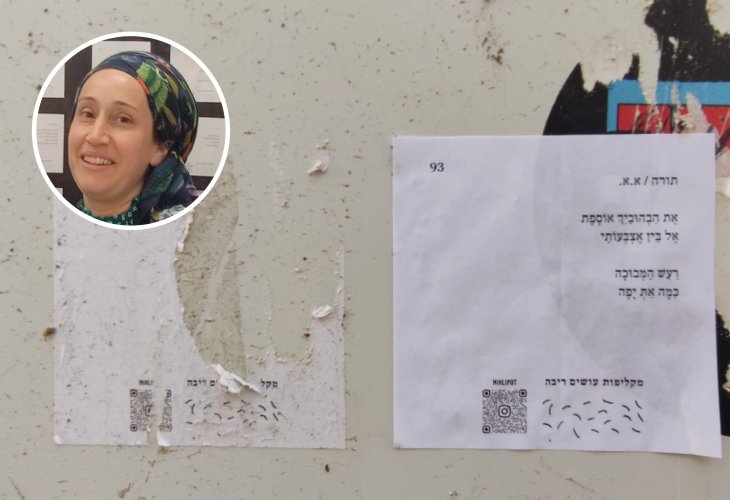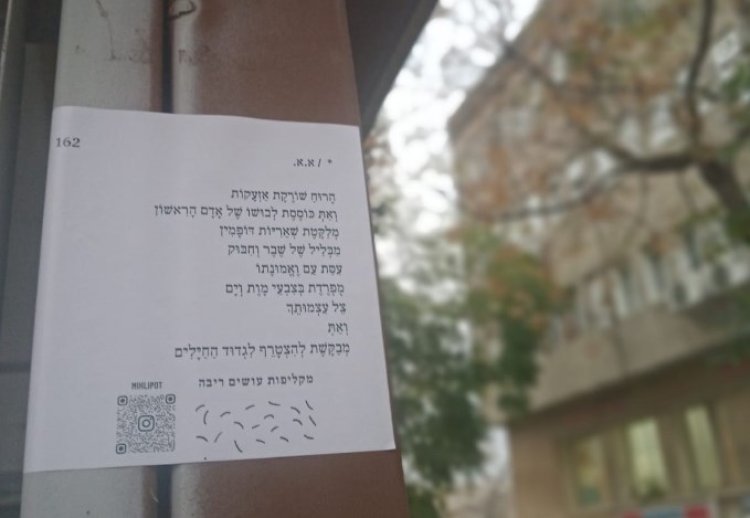Who is Behind the 'Song Stickers' Flooding the Streets?
When Ayala Elbaz, Yigal Yossian, and Herut Lubitz decided to publish 'Street Poetry,' they did not imagine it would become war poetry, strengthening many people. Now they tell their story.

The woman standing next to the electric pole in the Beit Hakerem neighborhood of Jerusalem found it hard to leave the spot. To onlookers from afar, it seemed puzzling, even strange. A completely normal-looking woman, suddenly planted in her place, staring in excitement at the pole. But those who approached could see the sticker attached to it. A simple white sticker with a few punctuated lines printed on it—short, poignant, and painful, expressing the feelings of these days of war.
If you also live in Jerusalem, you might have noticed them too—square white stickers with poems about a range of current events, mainly the 'Iron Swords Battle.' Each one, with just a few lines or even words, conveys a spectrum of emotions, ideas, and content. It’s clear that talented poets hide behind these writings, but it's challenging to identify them since they sign the stickers only with initials next to the project's name 'Making Jam from the Peels.'
Sticker Initiative
So who are the people behind these poems, and what led them to it? In trying to trace back the initiators, we reached Ayala Elbaz. Officially, she's a social worker, a criminology doctoral student with a focus on drama and addictions, but she has always been connected to literature and writing, which have become integral parts of her life in recent years. She is an author and poet who has published four children's books and has been involved in the project 'Making Jam from the Peels' along with Yigal Yossian and Herut Lubitz for the past year.
"I met my partners about a year and a half ago when all three of us participated in a professional evening," Ayala recalls. "We had the chance to talk, and all three of us discussed our strong desire to make poetry accessible to people. The feeling was that people wander the streets exposed to so much text—on advertisements, signs, or products, so why not also expose them to quality poetry, something meaningful that can contribute to the soul and maybe also the mood?"
Ayala explains that she and her partners are religious but come from very different points on the religious spectrum. "Yigal was born ultra-Orthodox, a yeshiva world graduate, I'm a baalat teshuva, while Herut belongs to the national religious sector. Precisely because of this, we felt we have a special strength to deliver a diverse message to the public that addresses all its layers," she explains. "We also feel there is a mission in it—to show that people from different backgrounds can connect and initiate something together. Since all three of us are believers, our poems often contain messages of faith, as well as connections to Torah and Hashem, though they also sometimes raise questions and discussions about challenges and difficult matters."
According to Ayala, because these are current poems that change over time, the decision was made to print them on stickers, which are then attached throughout the city, in various strategic locations such as traffic signs, electric poles, traffic lights, and street corners. They started in Jerusalem, but now the stickers are spread all over the country, including in the northern and southern regions.

Singing from Pain
When the three partners started the project, they never imagined that the poems they published on a wide variety of topics would soon turn into war poems. "We write about what is current and interests us, and naturally these days, they are about the situation," Ayala explains. "We receive very moving responses from people, who tell us how we managed to put into words exactly what they feel and give expression to their emotions. Soldiers who returned from Gaza after a long period also reach out, saying the songs seemed to wait for them and welcome them. The truth is, I sometimes feel that beyond the artistic aspect, the song also has a healing element, because when I read and also when I write, it expands my sense of belonging to our amazing nation and everything it goes through."
But how is it possible to sing in such difficult days, when people mainly want to cry?
"As we all know, the Book of Psalms is full of hymns written by King David, some filled with the pain of the troubles he endured during his life, yet they are still included under the title of poetry. From King David, we learn that precisely from pain and sorrow, one can talk to Hashem and strengthen faith. I don't compare our poetry, of course, to the Psalms, but when I try to ask myself how I can write in such times, the answer is that in times like these, I feel the need to write and put into words the feelings. One interesting thing to notice is that since the outbreak of the war, our poems have focused more on the entire nation rather than on our individual selves. It’s not something planned but comes naturally because we feel entirely part of the people of Israel."
Ayala says that after they paste the stickers, they also photograph them and upload them to the network. "While we cannot see people's reactions on the street, on the network it already gains resonance, and there are quite a few people who follow us with great interest."
Does it ever happen that people tear or vandalize your stickers?
"Yes, it happens, and it hurts us deeply," she admits, "but we understand that it’s the way of the world, and the stickers we printed will naturally wear out over time, and we'll replace them with others. On the other hand, I must admit there are also very enthusiastic responses, and there have been several times when I hung a sticker, and moments later saw an entire group gathering around it. Especially around the first and second weeks of the war, when people started to come out to the streets after Jerusalem looked like a ghost city for a period. The songs welcomed them, and I felt it was truly a great mission. I felt we were creating a dialogue with our readers."
The great public interest is also what drives Ayala and her partners these days toward a new project—writing a book of poems composed of stickers. "I think that after reading a good poem, the thing we most want is to share the experience with others, and this is truly the opportunity—to read, enjoy, and also share, and hopefully, we will only write about good things."

